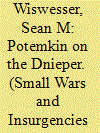|
|
|
Sort Order |
|
|
|
Items / Page
|
|
|
|
|
|
|
| Srl | Item |
| 1 |
ID:
151338


|
|
|
|
|
| Summary/Abstract |
In 2014, following the Russian invasion of Crimea, The Washington Post published [2] the results of a poll that asked Americans about whether the United States should intervene militarily in Ukraine. Only one in six could identify Ukraine [3] on a map; the median response was off by about 1,800 miles. But this lack of knowledge did not stop people from expressing pointed views. In fact, the respondents favored intervention in direct proportion to their ignorance. Put another way, the people who thought Ukraine was located in Latin America [4] or Australia [5] were the most enthusiastic about using military force there.
|
|
|
|
|
|
|
|
|
|
|
|
|
|
|
|
| 2 |
ID:
190603


|
|
|
|
|
| Summary/Abstract |
The key policy priority for governments around the world during the 2020–2021 period was the response to the Covid-19 pandemic. However, this was swiftly replaced by an even graver urgent need to respond to Russia's full-scale attack on Ukraine in February 2022. This special issue aims to study the post-pandemic response and how related policy choices influence decarbonisation and energy transition efforts in the EU. While the special issue was initially conceived before Russia's invasion of Ukraine, the question of policy responses to critical situations remains even more relevant in the face of Russia's attempt to redraft the political landscape of Europe by force. The dichotomy of existing views on whether the crisis caused by the pandemic is an opportunity or a threat to the energy transition is also present in the discussion and perception of the EU's energy and climate policy after the Russian invasion at least temporarily shifted energy security and decarbonisation priorities. Analysing energy and climate dimensions of the EUʼs post-pandemic recovery can provide policy implications applicable to the energy security crisis connected to the Russian invasion of Ukraine.
|
|
|
|
|
|
|
|
|
|
|
|
|
|
|
|
| 3 |
ID:
192653


|
|
|
|
|
| Summary/Abstract |
Russia’s airpower failure in the Ukraine war was due to incompetent air campaigning and execution, coupled with the success of a highly effective Ukrainian ground-based air defense. The Russian Air Forces (VKS) attempted to execute what they term a ‘Strategic Air Operation’ based on a ‘non-contact’ doctrine, articulated widely in recent years. But they could not achieve this in practice. As a result, like the famous Potemkin Village of Catherine the Great’s time, Russia’s Air Force today is only a façade of a modern twenty-first-century Air Force. Throughout the first eight months of the invasion, Russia failed to achieve air superiority, failed at suppression of enemy air defense, and failed to deny the use of airpower to its adversary. The absence of Russian airpower was prominently on display during the September 2022 counterattack in the Kharkiv area, where Ukraine took back 3,000 plus square miles of its territory and again with the counteroffensives in the south, where Ukraine retook Kherson. This paper explores both the ‘how’ of Russia’s airpower failure along with ‘why’ it could not execute its own stated doctrine.
|
|
|
|
|
|
|
|
|
|
|
|
|
|
|
|
| 4 |
ID:
192527


|
|
|
|
|
| Summary/Abstract |
When Russia launched a full-scale invasion of Ukraine on February 24, 2022, Ukrainians did not crumble under the unprecedented attack but showed steely resolve to fight for independence and the right to decide their own fate. In the Western media and scholarly analysis, the Ukrainian resilience is often associated with the leadership of the state, in particular President Zelensky. This article offers a different take on the issue of resilience in war and looks at the value foundations of Ukrainian identity, the decentralized nature of Ukrainian society and the vision of a better future as part of the Euro-Atlantic community to better understand Ukraine’s agency in response to Russia’s invasion. It draws on the original data, collected from interviews of three categories of Ukrainians, affected by the war: refugees, internally displaced people, and those living close to the frontlines.
|
|
|
|
|
|
|
|
|
|
|
|
|
|
|
|
| 5 |
ID:
192613


|
|
|
|
|
| Summary/Abstract |
This article explores an important and often overlooked element of Ukraine’s ability to defend itself against the Russian invasion in February 2022 – the adoption of a modified western transformational model of military reform – which has focused on mass and building a western style NATO interoperable and trained military. This article argues that Ukraine’s military reform since 2016, in particular the focus on Command and Control, the development of an NCO Corps and Special Forces as well as clear procurement priorities have created the enabling conditions for the development of a flexible and adaptable military force, able to limit Russia’s battlefield success and bring the fight to the enemy. Despite this progress, however, a recurring problem facing the Ukrainian military, that is likely to continue in the future, is how to balance the ongoing requirement for mass against the urgent need for military modernisation.
|
|
|
|
|
|
|
|
|
|
|
|
|
|
|
|
|
|
|
|
|